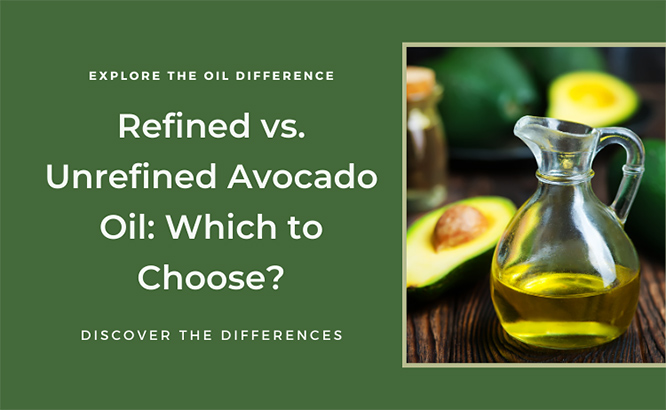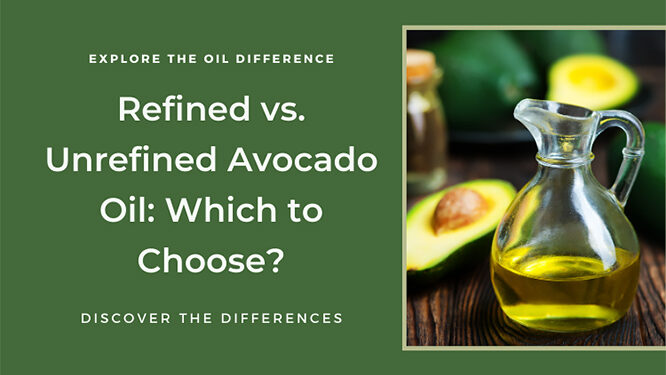
Should You Use Refined or Unrefined Avocado Oil? I mean, usually, everything unrefined is better and healthier, right? Less processing, more nutrients—it just sounds like the obvious choice. But is that really the case with avocado oil too?
I decided to look into this, and yes, unrefined avocado oil does have more nutrients than the refined version. But (and this is where it gets interesting) refined avocado oil has its own advantages. So, it’s not as simple as saying one is “better” than the other—it really depends on how you’re planning to use it.
Also, here’s something I didn’t expect: Avocado oil isn’t just a cooking oil. It’s actually super popular in skincare and haircare, too.
Ever used a moisturizer with avocado oil in it? I know I have! It’s one of those plant oils that people often apply to their skin before they even think about cooking with it. But when it comes to using it in food, there are some important things to consider.
So, let’s break this down properly. What’s the real difference between refined and unrefined avocado oil? Should you use both—but for different things? And what about cooking—do you need to be careful about which one you use? Let’s get into it.
Table of Contents
How Is Avocado Oil Actually Made?
So, how do we get that luscious oil out of an avocado? Let’s have a look at this first.
Cold-Pressed vs. Heat Extraction: What’s the Difference?
There are a couple of main methods to extract avocado oil:
- Cold-Pressed (Unrefined): This method involves mechanically extracting the oil at controlled temperatures, typically below 50°C (122°F), without the use of chemicals. This gentle process helps retain the oil’s natural flavour, colour, and nutritional content, resulting in a product rich in vitamins and antioxidants.
- Heat Extraction (Typically for Refined Oil): This method uses higher temperatures and sometimes chemicals to extract the oil, which can increase yield but may degrade some nutrients and alter the flavour.
Is It Similar to Olive Oil?
Yes and no. Like olive oil, avocado oil can be cold-pressed or refined, and it’s packed with healthy fats (mainly monounsaturated fats like oleic acid.
But the key difference? Olive oil comes from the olive’s pit, while avocado oil is extracted from the flesh of the fruit. That’s why avocado oil has a more buttery texture and a higher smoke point than most olive oils, making it great for cooking at higher temperatures.
What Happens During Refining?
If you’ve ever wondered what makes refined avocado oil different from its unrefined counterpart, it’s all about the extra steps it goes through to achieve that mild flavour and longer shelf life. Here’s a breakdown of the avocado refining process:
- Degumming: This initial step removes gummy substances like phospholipids from the oil. Think of it as skimming off the unwanted bits to keep the oil clear and stable.
- Neutralization: Here, free fatty acids are eliminated by adding a base (like sodium hydroxide), which reacts with these acids to form soaps that can be separated out. This step helps reduce the oil’s acidity.
- Bleaching: No, it’s not about adding bleach! This involves filtering the oil through materials like clay to remove pigments and impurities, resulting in a lighter-coloured oil.
- Deodorizing: To get that neutral scent and taste, the oil is steamed at high temperatures, which evaporates any strong odours or flavours.
- Winterization (Optional): This is like giving the oil a cold treatment. By chilling the oil, waxes and other solid fats crystallize and can be filtered out, ensuring the oil remains clear even when refrigerated.
While these refining steps make the oil more versatile for cooking due to its higher smoke point and neutral taste, they can also strip away some of the natural nutrients and flavours found in unrefined avocado oil.
Nutrient Comparison: Refined vs. Unrefined Avocado Oil
Refining avocado oil can make it more versatile for cooking due to its higher smoke point and neutral taste. However, this process can strip away some of the natural nutrients and flavours found in unrefined avocado oil. Here’s a quick comparison:
| Nutrient | Unrefined Avocado Oil | Refined Avocado Oil |
|---|---|---|
| Vitamins | Rich in vitamins A, D, and E. | Significantly reduced vitamin content due to heat and processing. |
| Antioxidants | Contains lutein, beta-carotene, and polyphenols. | Most antioxidants are lost during refining. |
| Fatty Acids | High in monounsaturated fats (oleic acid) beneficial for heart health. | Still high in monounsaturated fats but may lose minor compounds. |
| Phytosterols | Contains around 3~3.3–4.5 mg/g oil, mainly β-sitosterol (supports heart health) | Reduced levels due to refining. |
| Chlorophylls and Carotenoids | Present, giving oil its green colour and acting as antioxidants. | Mostly removed, leading to a lighter colour and reduced antioxidant capacity. |
Note: Specific nutrient values can vary based on processing methods and avocado quality.
Key Takeaway:
If you’re looking for maximum nutrients and antioxidants, unrefined avocado oil is the better choice. Refined avocado oil is still a good source of healthy fats, but it lacks many of the vitamins and bioactive compounds found in unrefined oil.
Decoding Avocado Oil Labels: What Do They Really Mean?
Before buying avocado oil, you should really understand what the labels mean—it can be totally confusing. Plus, it’s worth noting that these terms aren’t strictly regulated, so what you see on the bottle doesn’t always tell the full story. Here’s what you need to know:
Regular Avocado Oil
The term “regular” isn’t standardized in the industry, but it often refers to refined avocado oil. This oil undergoes processing to remove impurities, resulting in a neutral flavour and a higher smoke point.
Pure Avocado Oil
“Pure” avocado oil is another term that lacks a clear, standardized definition. In some cases, it may indicate that the oil is 100% avocado oil without any additives.
However, it’s important to note that “pure” doesn’t necessarily mean unrefined. For example, some products labelled as “pure” avocado oil are actually refined, offering a neutral taste and high smoke point.
Extra Virgin Avocado Oil
“Extra virgin” avocado oil is the least processed form, extracted from the first pressing of the avocado fruit without the use of heat or chemicals. This method preserves the oil’s natural flavour, colour, and nutritional profile, including all beneficial monounsaturated fats and antioxidants.
Extra virgin avocado oil typically has a rich, buttery flavour and a vibrant green hue, making it ideal for dressings, drizzling, or low-heat cooking to maintain its health benefits.
A Note on Quality and Purity
It’s worth mentioning that not all avocado oils on the market meet these labelling standards. Some products labelled as “extra virgin” or “pure” have been found to be adulterated with cheaper oils or are of lower quality.
A study from the University of California, Davis, revealed that a significant number of avocado oil samples were either rancid or mixed with other oils. To ensure you’re getting a high-quality product, look for reputable brands that provide transparency about their sourcing and processing methods.
Understanding these labels can help you choose the right avocado oil for your culinary needs, ensuring you get both the flavour and health benefits you’re looking for.
Refined vs. Unrefined Avocado Oil: Which One Should You Use?
Alright, so now that we know how avocado oil is made, what happens during refining, and the key differences in nutrients, let’s get to the real question—which one should you actually use?
The short answer? It depends on what you’re using it for. Cooking, skincare, and even shelf life play a role in whether refined or unrefined avocado oil is the better choice.
Quick Comparison: Best Uses for Refined vs. Unrefined Avocado Oil
Here’s a simple guide to help you decide which one to use:
| Use | Unrefined Avocado Oil | Refined Avocado Oil |
|---|---|---|
| Cooking (high heat, frying, roasting) | Good – High smoke point (~250°C/482°F), suitable for most high-heat cooking. | Best – Even higher smoke point (~271°C/520°F), ideal for frying and very high-heat cooking. |
| Salads, dressings, dips | Best choice – Retains natural flavour, colour, and nutrients. | Can be used, but has a more neutral taste. |
| Skincare & haircare | Best for deep hydration, antioxidants, and vitamins. | Works well, but lacks some of the nutrients found in unrefined oil. |
| Shelf life | Shorter – Can go rancid faster due to higher nutrient content. | Longer – Refining process extends shelf life. |
| Supplements & health benefits | Richer in beneficial compounds like phytosterols and carotenoids. | Still contains healthy fats but loses some bioactive compounds. |
👉 Quick takeaway: Use refined avocado oil for high-heat cooking and when you need a neutral flavour. Stick with unrefined avocado oil for cold uses, skincare, and when you want the maximum nutrients.
Using Avocado Oil for Different Purposes
Now, let’s get into the details—how does each type of avocado oil perform in specific situations?
Cooking with Avocado Oil: Which One Works Best?
If you’re planning to cook with avocado oil, here’s what you need to know:
- Frying, roasting, and grilling? Both refined and unrefined avocado oil can handle high heat. Unrefined avocado oil has a smoke point of approximately 250°C (482°F), while refined avocado oil is slightly higher at 271°C (520°F). If you want a completely neutral flavour, refined is the better choice, but unrefined still works well.
- Salads, dressings, or drizzling over dishes? Stick with unrefined avocado oil. It has a richer, more buttery flavour and keeps all the natural nutrients.
- Baking? Either one works! Refined oil will give a neutral taste, while unrefined adds a slight avocado note.
Avocado Oil for Skin and Hair: Does Refining Matter?
Avocado oil isn’t just for the kitchen—it’s also a fantastic natural moisturizer. But does refining make a difference?
- For deep hydration and maximum nutrients: Unrefined avocado oil is the better choice. It retains vitamins, antioxidants, and fatty acids that nourish skin and hair.
- For a lighter feel or sensitive skin: Refined avocado oil might be a good option, as it’s less likely to cause irritation.
Other Uses: Supplements, Pet Care, and More
- Taking avocado oil as a supplement? Unrefined is the way to go—it contains more beneficial compounds like phytosterols and carotenoids.
- Using avocado oil for pets? Both types can work, but unrefined may offer more health benefits for skin and coat health.
Conclusion: The Best Choice for You
So, is refined or unrefined avocado oil better? The answer depends on how you’re using it. If you need a high-heat cooking oil with a neutral flavour, refined avocado oil is the way to go. But if you’re looking for the most nutrients, antioxidants, and a rich, buttery taste, unrefined avocado oil is the better choice—especially for salads, dips, and skincare.
It’s not about which one is “better” overall, but which one works best for your needs. Now that you know the differences, you can choose the right avocado oil with confidence! 😊

























